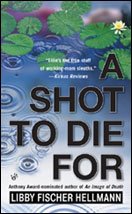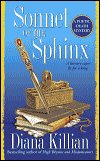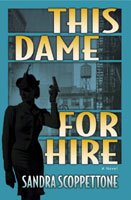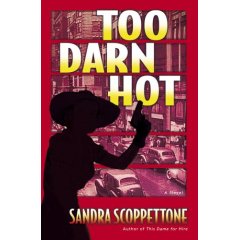That Influenced You--because although we can all
probably name a dozen books that shaped our writing--not to
mention our notions of how the world worked (and our place in it)
--sometimes we forget the impact of film.

So who better to kick off the discussion than guest
Girl Detective Libby Fischer Hellman. Libby, in case you
didn't know this, is the award-winning author of the Ellie
Foreman series about a film-maker sleuth.
==========================================================
Vintage Films: The Sound of Music
First off, as a stable-mate of the Girl Detective (we share
the same agent), I’m honored to contribute to a discussion of
vintage films. Thanks for having me!
I was 16 when “The Sound of Music” came out. It isn’t a classic –
in fact, my top 5 are The Godfather, Chinatown, The Battle of Algiers,
Citizen Kane, and Casablanca. The acting wasn’t great. The story was
somewhat contrived. It was basically just a sentimental musical with
pretty pictures and Julie Andrews’ wonderful voice. Still,
The Sound of Music changed my life.
I cried when the Captain Von Trapp finally declared his love
for Maria. I marveled at their daring escape from the Nazis. I
sang along with “My Favorite Things” and, of course, “Sixteen
Going on Seventeen.” But what touched me in a visceral way and
made me go back to see it three times -- those being the days
before VCRs and DVDs – were the sweeping panoramic shots of
the Austrian hills.
I remember one particular shot at the beginning – it must
have been an aerial, although I didn’t know what that was
back then – of Julie Andrews. The camera started on an
extreme wide angle – she wasn’t much more than a dot on
the screen. Then the camera panned and moved in on her
as she was twirling around singing the title song. They
must have cut to a stationary shot of her after that, but
I still remember the camera move. It wasn’t slow, in fact
it must have been rather fast, because it wasn’t at all
shaky. Even so, for me those few seconds became one of
those fundamental Proustian “Petite Madeleine” moments
in my life.

I still can’t tell you precisely what it was about the shot:
the greenness of the hills, the natural contours of the hills
and valley, the achingly blue sky, or the snow-capped mountains
in the distance (Were they the Austrian Alps?) But for the first
time in my adolescent life, I wanted to know that world.
Not just observe it on film. I wanted to sink myself into
it, to revel in the beauty, to understand the people and
the culture that sprang from it.
It was that simple. From that moment on, my only goal
was to go to Europe. To Austria. To see and feel that
scene for myself. I remember coming home from the movie
theater and writing the Experiment in International Living.
Two years later, I achieved my goal. I went to Europe for
two months. Not to Austria -- I didn’t speak a word of German
– but to France. And four years after that, I ended up at
NYU’s graduate school of film. I’ve produced films and
videos ever since, and my mystery series features Ellie
Foreman, a documentary and industrial video producer.
Was The Sound of Music responsible? Who knows?
Maybe it was simply an adolescent girl becoming
aware -- for the first time -- that a world beyond
high school, boyfriends, and the Beatles existed.
Maybe it was some kind of ancestral mitochondrial
DNA calling me -- my ancestors did come from that
part of the world. But maybe it was a subconscious
realization that film can kindle a need to explore
places, people, and stories that broaden and enrich
our world.
Now… can I tell you about the movie “Z?”
Libby Fischer Hellmann
A Shot to Die For, Readers Choice Award
for Best Traditional Novel
An Image of Death
A Picture of Guilt, Finalist Ben Franklin Award
An Eye for Murder, Anthony nominee





